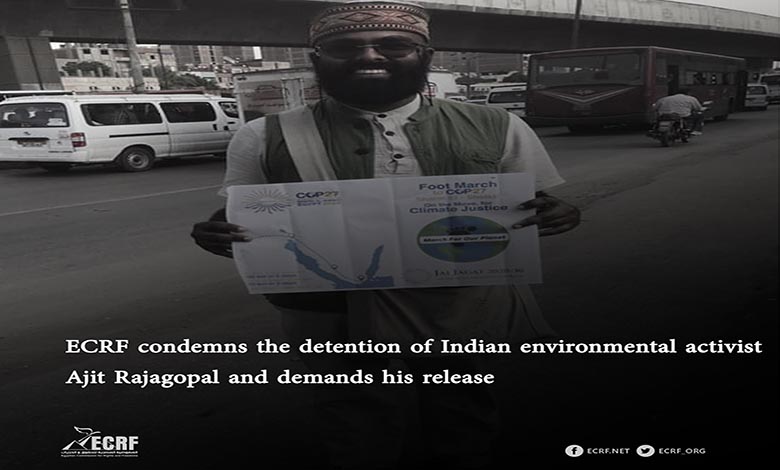The Egyptian Commission for Rights and Freedoms (ECRF) condemns the arrest and detention of Indian environmental activist Ajit Rajagopal for more than 24 hours in violation of the law, after he was arrested at a security checkpoint during his journey to Suez Governorate on foot and from there to Sharm El-Sheikh to attend the Climate Summit. ECRF considers the illegal arrest and detention of the activist as a confiscation of the simplest types of expression of the dangers of climate change on our planet, which are walking campaigns to warn of the dangers of emissions. These campaigns have taken place and are being conducted in several countries.
In this context, ECRF wonders, “Why did the Egyptian government request to host the Climate Summit, as long as the security restrictions will obstruct the simplest movements and manifestations of protest against the environmental crises?”
Security forces had arrested the Indian activist at noon on Sunday, October 30, as he was planning to walk 260 kilometers on foot by heading from Cairo to Suez and then to Sharm el-Sheikh, where the Climate Summit, which he came to Egypt to participate in, will be held. The Indian young man was surprised by his arrest and detention from a security checkpoint. He contacted his lawyer and friend, lawyer Makarios Lahthi, who immediately went there, after which any communication with the two was cut off.
After 24 hours of detention, the security forces in the Obour police department released lawyer Makarios Lahthi, while they are still holding the Indian activist, with promises of his release soon.
Indian activist Ajit Rajagopal is part of the global campaign “Walk for the Planet”, which is launched in Africa in conjunction with the climate summit in Sharm El-Sheikh, COP 27, as it targets several African countries such as Kenya, Uganda, Sudan and other countries, to raise awareness of the risks of carbon emissions on the planet and spread a cleaner and safer environmental culture. The most prominent activities of the campaign are calls for walks to raise awareness of environmental risks. The Walk for the Planet campaign also focuses on the local community to highlight local initiatives undertaken by communities within their capabilities to address climate change, poverty, loss of biodiversity, desertification, pollution prevention, food security, and other topics, by creating awareness and building capacities and integrating mobilization strategies at the same time.
ECRF demands the immediate release of Indian activist Ajit Rajagopal, and to allow him to continue his pre-planned march, which aims at nothing but warning of the dangers of climate change, especially as it is a recurring event in many countries.

